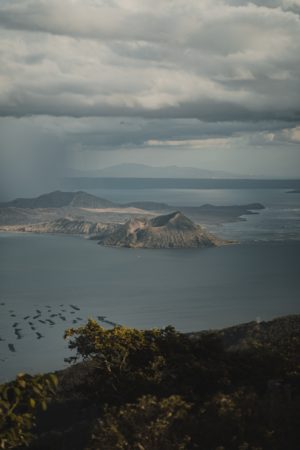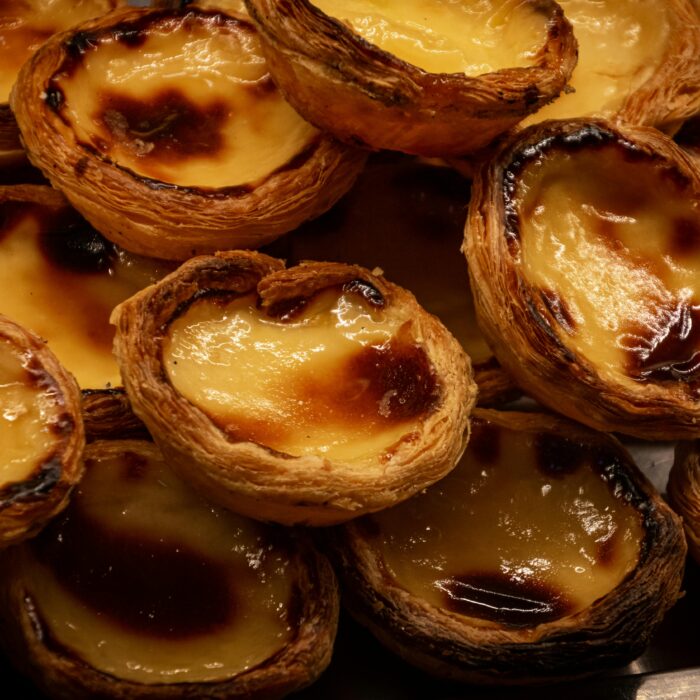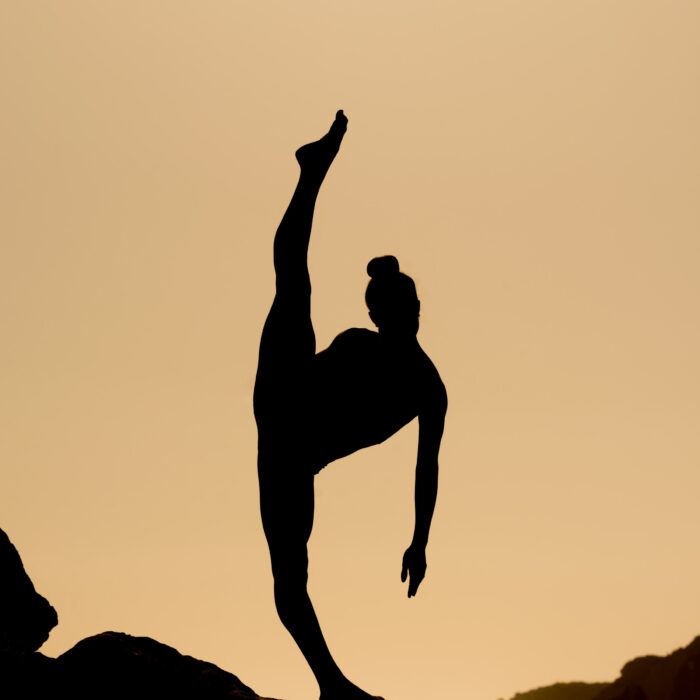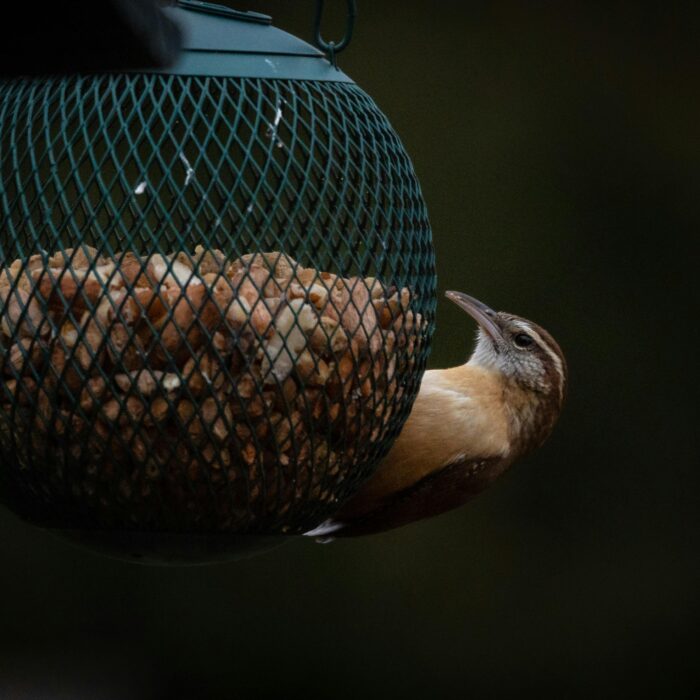You have no items in your cart. Want to get some nice things?
Go shopping
The van sped through the provinces, past cement houses and bungalows sinking in the dust. Droopy roadside markets flashed in the headlights and vanished in the rearview mirror. Our tires kicked loose gravel down the road’s narrow edges as men emerged like apparitions around sharp curves, wandering on the side of the road or urinating in ditches at four and five a.m.
Next to the hired driver, my uncle Francisco sat with his seat reclined and arms folded behind his head, unfazed by the sudden turns and shifts in acceleration. It seemed that no matter where we were, my uncle found a way to relax. He had a job; he was the head policeman of the barrio, but I had never seen him in uniform. “Corrupt,” my husband Sam said after spending hours on the porch with him drinking San Miguel beer. “Your uncle’s a corrupt cop.”
In the van’s middle seat, my mother jabbered in Tagalog with Francisco’s girlfriend, Chesa. As usual since we’d arrived, my mother was doing most of the talking, her short body jumping and swaying with wild gesticulations. Chesa was taller and more slender than my mother, but they had the same round face, wide nose, and broad shoulders. The two women could have been sisters, my mother the smart one, Chesa the pretty one.
The women’s shrieks and screams made my muscles tense. Since our arrival at my uncle’s house, I’d awoken each morning to my mother’s laughter and the cocks crowing, and I couldn’t tell the difference when their voices mixed.
It was a side of my mother I had never seen before. My mother, who would hide from her neighbours in the grocery store. My mother, who would scrub the dishes most thoroughly when her American in-laws were visiting, busying herself in the kitchen to avoid conversation.
When I had a moment alone with her, I’d asked about it. She was gathering laundry to wash at the well. “How come you never laughed like this at home?” I asked.
Her accent was as thick as the day she immigrated to America with me, her infant daughter, in her arms. “Because there was nothing to laugh.”
Outside it was still dark. At the horizon, the sky lightened from black to faded-jean blue, the only trace of the sun that loomed just beneath it. In the back seat beside me, Sam was asleep or pretending to be. I swept a blond strand of hair off his forehead.
He’d reluctantly agreed to a trip to the Philippines with my mother in lieu of a honeymoon. With our wedding money, we could have gone wherever we wanted. His suggestions of Costa Rica and Barcelona were tempting, but I couldn’t blow the only opportunity I’d ever had to meet my mother’s family and to reunite her with her parents, whom she hadn’t seen in twenty years. “My grandparents are old,” I’d told Sam. “What if I never have a chance to meet them?” I warmed him up to the idea with photos of white, sandy beaches and coconut trees. He could go snorkelling, try real Filipino cuisine. But he didn’t agree until he saw the book 1000 Places to See Before You Die. He wanted to climb Taal Volcano and see its famous crater lake – a lake within a volcano within a lake.
The road grew windier and wrapped around the mountainside as we approached Tagaytay, the city overlooking Taal Volcano. As day broke, rays of sunlight revealed hills lush with pineapple crop. Roadside vendors sold fruit in thatched huts with tiny bananas strung along the roofs.
The driver pulled over so that we could look at the fruit. So many colours and shapes, so many things I had never seen before. “What’s this?” I asked my mother.
“Try it,” she said. So we bought star apples, jackfruit, mangosteen, calamansi. We ate bananas in the van and threw the peels out the window.
Tagaytay’s cliffside mansions were the most lavish homes I’d seen in the Philippines. Many were vacation homes built by Manila’s rich and famous, Chesa explained. Unlike my uncle’s dreary cement home, these houses were brightly painted, dotting the mountain like giant gumdrops.
We stopped at a cliff overlooking Taal Lake. The water was so deep and opaque, it looked black. Whitecapped waves glared like diamonds. Canoe-shaped bancas transported passengers to an island that stretched for miles. Hills ascended gradually toward the centre then swept stiffly into the volcano’s summit. In the crater was another large lake, obscured by patches of fog. Although we couldn’t see it from the ridge, Chesa said that inside the crater lake was another, smaller island.
“No, no, no,” my mother said when I asked if we could take a banca to the island. “You are not going in a boat.”
“Mom,” I smiled down at my mother, amused by her perpetual fearfulness of life. “Why not?”
“Because I said so.”
My mother had used those words against me in every argument we’d ever had, and I was surprised to find that time had not changed things.
“Look, Luz,” Sam said. “The boats are safe. The outriggers keep them from capsizing.
See?” He pointed at a banca rocking gently.
“No,” my mom said again. “One time our boat tip over and we almost drown. Never again,” she said. “Never again.”
“When did that happen?” I asked.
“When I went to Capones Island.”
“You never told me about that.”
“I went to Capones Island with the American lady I work for. She was pregnant, boy she was huge! But she was fat to start with.” My mom laughed. Sam raised his eyebrows.
“The boatman took us there. The ride was nice, but when we went home, it was windy, the boat was shaking. When we are very close to shore, the engine does not work anymore. We were scared, we screamed, ‘Help, help, help!’ No one heard us. So the boatman finally got out and push the boat to shore. My heart was pounding, I almost have anxiety attack! I tell you Emily, if you don’t know how to swim, the current will take you away till you get to the middle and drown!”
It took Sam a moment to process the information. “So your boat didn’t actually tip over?”
“No,” she finally said in her pouty way when someone used logic against her. “But we got stuck there so we almost drown.”
“You said you were close to shore,” Sam said.
My mom looked at my uncle for help.
“The waves are not uniform.” His tone was of a proclamation. “Look at those boats, how they rock! The wind comes from all directions. You cannot tell where it comes.”
Sam ignored him. “You’re telling me you won’t allow us to go in a boat because one time you were in one and the boatman had to push you a little ways to the shore?”
She didn’t say anything but stared at me with her black eyes. It was a look I had seen a million times, and always at the first sight of it, I looked away. But this time I kept my gaze locked on my mother’s. I’m sorry, I said silently, noticing for the first time a filmy quality in my mother’s eyes. Their black irises were fading at the edges, forming a thin blue ring. Had they always been like that, or was it a sign of age? I felt my mom’s eyes boring through me, as if she could see through to my soul everything that I was, and she did not like what she saw.
My face grew hot. “What?” I asked. My voice was coarse. My mother turned and began walking toward the van.
I watched her back, her almost-five-foot-tall figure bent low as she made her way up the incline. Sam put his arm around me. “Can’t argue with that logic,” he said under his breath.
I shrugged him off and followed my mother.
*
Our hotel room had no windows and no hot water. The toilet leaked, and the TV got spotty reception. But Sam and I had a room to ourselves. At my uncle’s house, our bedroom door didn’t lock, and the windows were unprotected by screens or glass. Anyone could stick their hand through the window, pull the curtains back, and peek at us at any moment, and they did.
For the first time in days, privacy. Sam reached across the bed and started to pull off my shirt. “Come here, my Island Princess.” His pet name drove me mad.
“I can’t. My stomach hurts.”
“Take some Imodium.”
“I did, but it’s not helping.”
I grabbed a magazine from the nightstand – an eleven-year-old issue of Time – and pulled the bathroom door closed. I was still angry from the previous night, when my cousins took us to a club on Subic Bay Naval Base. It was where my parents had met when my father was stationed in the Philippines with the US Navy. A band played rock covers from the ’80s and we ordered a bucket of San Miguel beer.
I was ready to leave before Sam was.
“You don’t have to come,” I said. “Just give me the key.”
“What are you going to do? Go back to the hotel and sit there alone? Don’t you know this is the last time you’re going to see these people?”
“I’m going to see them again. I’ll come back.”
“Really, Emily? In 24 years, how many times did you come back?”
My face grew hot, but I stayed quiet.
“C’mon,” he said. “Let’s just finish our drinks.”
His bottle was half empty, but he nursed it to stretch out our stay. I took a sip of my beer. It had warmed in the heat, but the wetness felt good against my dry throat. I kept drinking.
I took the magazine out of the bathroom and showed it to Sam. “Look,” I said. “When this volcano erupted, the hospital I was born in got crushed by volcanic ash.”
“That’s wild,” he said, but his eyes stayed fixed on the TV.
*
Instead of hiking Taal Volcano, we went to a nearby casino to placate my mother. Tagaytay’s Casino Filipino was one of the largest casinos in the Philippines. It had 150 slot machines, 20 poker tables, and a red Corvette offered as a jackpot.
A sign at the entrance prohibited patrons from using a slot machine until the previous user had been absent 15 minutes. I had never seen anything like it.
“See,” I whispered to Sam. “They’re so superstitious. They believe they have the power to influence things.”
As many times as I had tried to explain to my mother the laws of probability, the unlikely odds of her ever “winning the lottery,” nothing could convince her that it would not happen. When I win the lottery, Emily, I will buy you a big house. When I win the lottery, I’m gonna buy your dad a nice car. I’d asked her a million times while growing up, When will we go to the Philippines? The answer was always the same: When I win the lottery.
Marry a rich man, she’d say, with a playful pinch that didn’t feel so playful.
My mother handed a handful of cash to Chesa and Francisco. They wandered through the beeping machines, weighing their options. Sam and I split off and headed up a wide staircase.
On the second floor were a Chinese restaurant and several rooms set up for table play. Besides a few people eating in the restaurant, most of the rooms were empty. The door to one was propped open. Inside were dozens of rows of pews. Burning candles lined an altar, a fake wreath hung on a podium.
I had not been in a church in years.
“Wow,” Sam said. “Unbelievable.”
It was absurd. If I told my mother, would she come upstairs to pray for a jackpot? I slid into a pew and knelt. I clasped my hands under my chin and closed my eyes. It was a position once so familiar, now so unnatural and strange. What would I pray for? I could think of nothing but the redness of my eyelids, the dark spots and flashes of light that appeared on them, how they played before me like a blank film.
*
My family ate lunch at a restaurant overlooking Taal Lake, discussing our plans for the day. On the table was a plate of sisig, pigs’ ear. We squeezed lemon over the shredded meat and ate it with rice.
“It’s just shredded pork.” Sam said. But I refused to try it. He ate all the strange food my relatives placed before him: squid, sashimi, tiny crabs. He even ate the balut, a delicacy in the Philippines – a boiled egg with a partially formed chick embryo inside.
I avoided the strange food, yet I was the one who got stomach cramps after only a few days.
My mom suggested shopping, Chesa the zoo.
I looked out the window. “We want to climb the volcano,” I said.
“Ay anak,” my mom said. “I said no.”
“But why?” I felt as if I were eight years old again, begging my mother to take me on the Ferris wheel.
“It’s dangerous,” my uncle said. He was taking over resistance efforts this time.
“Francisco, we’ll be fine. Sam’s a good swimmer. I’ll wear a life vest.”
My uncle narrowed his eyes at me and said, “You don’t know how life is like here. I am a policeman. I see reports. Someone’s gonna kill you.”
At this, Sam and I burst out laughing. “I’m sure driving to work every day in Chicago is more dangerous,” Sam said.
“No,” Francisco argued, “You don’t believe. You don’t know the NPA.”
“What is that?” I asked.
“The New People’s Army,” Chesa explained. “They don’t like Americans.”
“They live in the mountains,” my uncle went on. “Just like the Huk.”
“The Huk? Didn’t they help the Americans in World War II?” I asked.
“Noooo!” my mom cried. “They’re the enemy, silly! The Hukbo, that’s what they call it!”
My mother exploded in a fury of Tagalog. I could not understand a word, but her voice was high and pleading, fast and slow, syllables enunciated and drawn out. I could see the frustration and anger exiting her body through swinging arm movements. When she was done, the restaurant was silent and people had begun to stare. Sam and I were the only ones who hadn’t understood.
“So basically, you’re saying we can’t hike up the volcano because some guerrilla fighters on it are going to kill us,” Sam said.
My mother ignored him and locked eyes with me. It was a piercing glare – and misdirected. Sam was the one being difficult.
Chesa sighed. “Ah, Luz. Let them go. I will go with them.”
My mother’s face looked tired and puffy. “Sige, sige,” she said. Ok, ok. It was more of a surrender than an agreement.
*
The handmade banca was sky blue on the outside, yellow on the inside. The bancero, a small man with a smiling face, stood with his bare feet in the water and helped me into the boat. Chesa crawled in after, holding the sides of the boat with both hands. Sam climbed in unassisted and distributed the life vests that were under his seat. We waved goodbye to my mother and Francisco as the bancero pushed us off shore, jumped in, and pull-started the engine like a lawnmower.
The breeze was cool against our skin, and wisps of hair swatted our faces. The sun was high in the sky, and I regretted that we had not brought sunscreen. Sam’s nose was already pink.
I watched the water for signs of life, but save for a few dark shadows found nothing. Sam photographed my fingers dipping in the water. We hit a rocky patch, and water shot up and pooled inside the boat. Sam tucked away his phone.
We were in the banca a long time, heading slowly toward the volcano. It was farther away than I had realised. When we finally reached the sandy beach, the mountains stretched so high above us I could no longer locate the volcano’s summit.
“Maybe we should just go back,” I said. “I don’t want to keep them waiting.”
“They can wait two hours. We’re already here,” Sam said.
Tourists were gathered at the base of the mountain, some just arriving and others on their way back. We followed a stream of people along a gravel path to a corral, where we rented a pony and guide.
The pony was an emaciated palomino with a mane that stood on end. Our guide was a woman in her 70s in flip-flops and a straw hat. She had a dark, wrinkled face, and her feet and legs were covered in dust. I felt guilty climbing into the saddle.
“Do you want to ride double?” I asked.
But the guide took the lead rope and began walking. “Boyfriend?” she asked.
“Husband.”
“Just married? Honeymoon?”
“Mm-hm.”
As we made our way along the path, I watched the guide’s back, the movement of her shapeless but brightly coloured sarong. The woman’s agility surprised me, the way she manoeuvred around the ruts and the loose rocks.
The horse trudged after her, head bent low, speeding up at the crack of the whip before falling back to a snail’s pace. I wondered when it had last had a drink. I imagined the horse collapsing beneath me at any moment.
Sam called for us to stop. When he caught up, he said that Chesa was done, she was going back down and would wait for us at the corral.
“Why doesn’t she ride the pony?”
“She didn’t want to.”
We decided to trade. Sam crawled on the horse and convinced the guide to get on behind him. I photographed the two of them on the back of the horse, their bodies swaying as the horse stumbled.
We had countless photographs and hours of video, but still we documented the hike up the mountain. Whoever was not on horseback would photograph the other, shooting from behind or running ahead to capture the riders head-on.
We’d recorded meeting my family at the airport, my uncles butchering the cow, my little cousins feeding mango leaves to the goat, Sam riding the carabao in the yard, and photograph after photograph of our welcome home party, family and strangers dancing, eating, singing, laughing.
Only once had I been asked to put our phones away, and that was when Sam recorded the chocolate meat. My mom had pulled me aside, into the bedroom, and asked me to make Sam stop.
“You don’t care that he recorded them slaughtering the cow, but you don’t want us to record people eating meat?”
“It’s gross,” my mom said. “He’ll show it to his mom.”
“He’s not going to show it to his mom! Besides, you can’t even tell what it is. It just looks like ground beef!”
And it was ground beef. Ground beef mixed with the blood and entrails and bits for which there was no other use. One bite had made me dry heave. But it was my mother’s favourite dish.
The hike was treacherous at the top. The rocks there were larger, jagged, and loose, the path steep. Lava flow had carved out deep ruts I had to pick my way around. My feet sent rocks careening down the mountainside. I picked up a black piece of hardened lava. It was too big to fit in my pocket, so I carried it in my free hand.
When we got to the top, Sam bought the guide a Pepsi, and we left her and the horse to rest. We walked over to the rim, where a line of tourists looked down into the crater of the volcano. The lake inside was so green and clear that I could see the white sand beneath the shallow water. Little foam bubbles formed and burst at the water’s edges, and in a couple of places steam was rising. It felt warmer to her there, watching the steam, and I wondered whether the heat was from the volcano or if I was imagining it. In the centre of the lake was a tiny green island.
*
The sky was dark by the time we made it back to the boat. Clouds loomed dense and low, obscuring the sun and sky. The wind had picked up and the cold air off the lake brought goosebumps to my arms.
I watched a banca running parallel to them, its rise and fall matching our own boat’s. The bow crashed on a wave and the stern lifted, then the stern crashed down and the bow lifted. The engine buzzed as we rocked along.
Waves splattered and a puddle accumulated in the boat. My lava rock drifted from one end to the other, swept along by the moving water.
We reached the halfway point soaked and windblown. I tied my life vest tighter and double-knotted it. I looked at Chesa but didn’t know her well enough to tell whether she was scared. Chesa was watching the waves with her arms crossed over her chest.
I reached for Sam’s hand.
The boat began rocked harder and leaned from side to side. With each gust, the outriggers plunged beneath the water. The bancero directed the boat with the oars but struggled to keep it pointed toward the shore. He closed his eyes against the sea spray and tightened his lips.
“Are we going to tip over?” I asked Sam.
He squeezed my hand.
I had never been in a boat that tipped over. Would it be a gentle plunge, or would there be a struggle? Would my head hit the boat? Would I get trapped underneath?
I could see the shore now. My mom would be there waiting with my uncle, their faces creased with worry, watching for our arrival. Over the boat’s motor, I imagined my mother’s voice. How loudly she would yell when she saw me, soaked and scared. How she would say I told you so.
A gale attacked the boat and did not relent. I closed my eyes and felt the boat lifting.
It was a gentle plunge, no time even to think about banging into the boat. The icy water stung. It was at once over my head and in my shoes and in the weight of my clothes clinging to my body. The shore, I knew, was not far off, but I sensed it growing farther.
I rose to the surface and located the shore. There was the sand, the water that separated me from it. With each wave I was losing ground. I swam toward the capsized boat, buoyed by my life jacket. A wave poured over my head and I coughed out the salty liquid. I was almost to the boat, and so was Sam. He moved quickly with broad strokes and reached the boat before me. He clung to an outrigger and waved his arm.
“C’mon!” Sam’s voice sounded far away.
I kicked and paddled and struggled against the waves after wave that poured over me. My arms and legs were tired. Chesa and the bancero reached the boat and were struggling to tip it over.
“What are you doing? C’mon!” Sam called, louder, and my legs stopped. My stomach was in stitches. Suspended in the water, a wave struck and carried me. I felt the distance growing wider. Miles wider every second.
By Elizabeth Iversen





